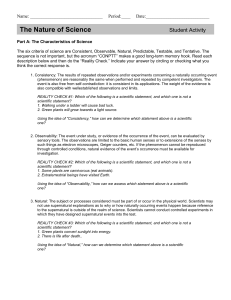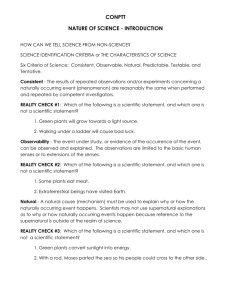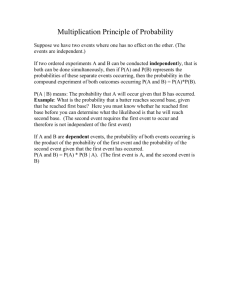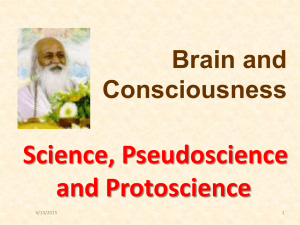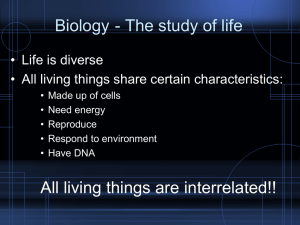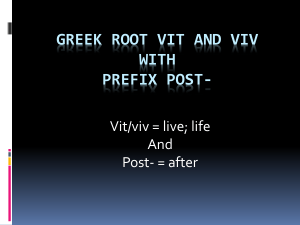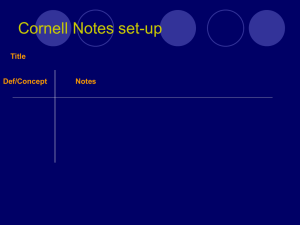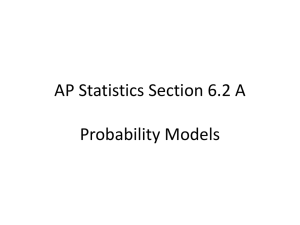CONPTT Notes Outline
advertisement
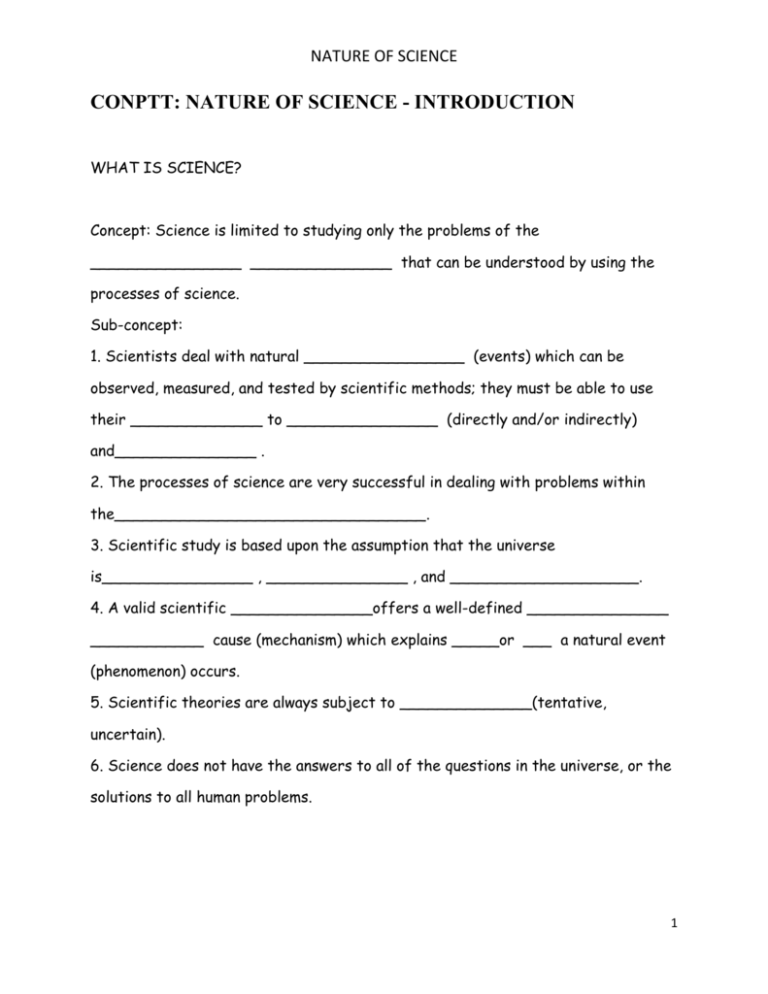
NATURE OF SCIENCE CONPTT: NATURE OF SCIENCE - INTRODUCTION WHAT IS SCIENCE? Concept: Science is limited to studying only the problems of the ________________ _______________ that can be understood by using the processes of science. Sub-concept: 1. Scientists deal with natural _________________ (events) which can be observed, measured, and tested by scientific methods; they must be able to use their ______________ to ________________ (directly and/or indirectly) and_______________ . 2. The processes of science are very successful in dealing with problems within the_________________________________. 3. Scientific study is based upon the assumption that the universe is________________ , _______________ , and ____________________. 4. A valid scientific _______________offers a well-defined _______________ ____________ cause (mechanism) which explains _____or ___ a natural event (phenomenon) occurs. 5. Scientific theories are always subject to ______________(tentative, uncertain). 6. Science does not have the answers to all of the questions in the universe, or the solutions to all human problems. 1 NATURE OF SCIENCE HOW CAN WE TELL SCIENCE FROM NON-SCIENCE? Goal: Following the discussion of "CONPTT", the student will be able to distinguish between scientific and non-scientific statements. SCIENCE IDENTIFICATION CRITERIA/THE CHARACTERISTICS OF SCIENCE Six Criteria of Science: Consistent Observable Natural Predictable Testable Tentative The sequence is not important, but the acronym "CONPTT" makes a good long term memory hook. 1. Consistency: The results of _____________ observations and/or experiments concerning a naturally occurring event (phenomenon) are reasonably the ___________ when performed and repeated by competent investigators. The event is also free from______________________: it is consistent in its applications. The weight of the evidence is also compatible with well established observations and limits. REALITY CHECK #1: which of the following is a scientific statement, and which one is not a scientific statement? 1. Green plants will grow towards a light source. 2. Walking under a ladder will cause bad luck. 2 NATURE OF SCIENCE Using the idea of "Consistency", how can we determine which statement above is a scientific one? 2. Observability: The event under study, or evidence of the occurrence of the event, can be ____________ and______________ . The observations are limited to the basic human ___________ or to extensions of the senses by such things as electron microscopes, Geiger counters, etc. If the phenomenon cannot be _______________ through controlled conditions, natural evidence of the event's occurrence must be available for investigation. REALITY CHECK #2: which of the following is a scientific statement, and which one is not a scientific statement? 1. Some plants eat meat. 2. Extraterrestrial beings have visited Earth. Using the idea of "Observability", how can we asses which statement above is a scientific one? 3. Natural: A natural cause (mechanism) must be used to explain why or how the naturally occurring event happens. Scientists may not use _________________ explanations as to why or how naturally occurring events happen because reference to the supernatural is ______________ of the realm of science. Scientists _______________ conduct controlled experiments in which they have designed the intervention of a ______________ __________ into the test. REALITY CHECK #3: which of the following is a scientific statement, and which one is not a scientific statement? 1. Green plants convert sunlight into energy. 2. With a rod, Moses parted the sea so his people could cross to the other side. 3 NATURE OF SCIENCE Using the idea of "Natural", how can we determine which statement above is a scientific one? 4. Predictability: The natural cause (mechanism) of the naturally occurring event can be used to make specific_______________. Each prediction can be tested to determine if the prediction is true or false. REALITY CHECK #4: which of the following is a scientific statement, and which one is not a scientific statement? 1. Without sunlight (or comparable artificial light), green plants will die. 2. If you are a "Scorpio", your horoscope for today is "You'll be saying 'I feel rich !' Lunar position highlights back pay, refunds, correction of accounting error." Using the idea of "Predictability", how can we determine which statement above is a scientific one? 5. Testability: The natural cause (mechanism) of the naturally occurring event must be _____________ through the processes of science, controlled experimentation being essential. Reference to supernatural events or causes are ____ _______________ tests. REALITY CHECK #5: which of the following is a scientific statement, and which one is not a scientific statement? 1. The Bermuda Triangle causes ships and planes to sink and disappear. 2. Life comes from life and cannot come from non-life. Using the idea of "Testability", how can we determine which statement above is a scientific one? 4 NATURE OF SCIENCE 6. Tentativeness: Scientific theories are subject to ________________ and _________________, even to the point of the theory being proven ____________. Scientific theories have been modified and will continue to be modified to consistently explain observations of naturally occurring events. REALITY CHECK #6: which of the following is a scientific statement, and which one is not a scientific statement? 1. The number of human chromosomes was once "known" to be 48, but is now considered to be 46. 2. Living things were once grouped into 2 major groups, then 3, then 4, and now 5, because the criteria used for classifying living things have changed. 3. We know that the world began about 6000 years ago, and nothing will change that. 4. At one time, it was thought the heart pumped blood out of a large container as an "open system", but now it is known that blood "circulates" in a closed system. Using the idea of "Tentativeness", how can we asses which statement above is a scientific one? WHAT IS "EMERGING SCIENCE"? Emerging Science Defined: Emerging science (or "protoscience") may be defined as a "__________ science". A protoscience tends to conform to most of the CONPTT criteria but typically ______________ _______________ in one or more of the criteria. A protoscience differs from a science in that consistent observations and predictions may be _________________ by knowledge and/or technology. For example, let's look at parapsychology. This includes such phenomena as clairvoyance, precognition, and psychokinesis. Scientists generally 5 NATURE OF SCIENCE consider parapsychology a pseudoscience because its phenomena _________________ with known physical laws. However, at least one member of the parapsychology family, _______________ __________________ (thought transmission directly from one brain to another), might be worthy of scientific consideration. Mental telepathy, then, could be considered as a "protoscience". WHAT IS "NON-SCIENCE"? Non-Science Defined: Non-science may be defined as an area of knowledge which ______ ______ meet the criteria of science (CONPTT). Non-science topic areas may be very logical and based on good reasoning, but simply do not fall within the ______________ of science. They would include any _____________ system, e.g., religious beliefs, philosophy, ________________ ______________ or attitudes, a sense of esthetics, or_______________. WHAT IS "FALSE SCIENCE"? False Science Defined: False science ("pseudoscience") may be defined as a nonscience which is ______________ and advertised as ___________________ science by its followers and supporters. Good examples of a pseudoscience would include "_______________________ " (as presented by some of its supporters), and "__________________ _______________”. SUMMARY Science is a _____________________ discipline that studies only ____________________ occurring events, while offering ___________________ explanations for the phenomenon under study. The data must be consistent, observable, predictable, and testable, while any conclusions or theories must be____________________ . 6 NATURE OF SCIENCE CRITERIA CRITERIA WITHIN THE REALM OF SCIENCE OUTSIDE THE REALM OF SCIENCE Experimental results and observations are the same. Experimental results and observations are NOT the same OBSERVABLE The phenomenon (event) or evidence for the event can be observed by the human senses or by extensions of those senses. The phenomenon (event) or evidence for the event can NOT be observed by the human senses or by extensions of those senses. NATURAL A natural cause or naturally occurring mechanism is used to explain how or why an event happens. A natural cause or naturally occurring mechanism CANNOT be, or IS NOT used to explain how or why an event. happens. PREDICTABLE Accurate predictions and conclusions are based on natural causes NOT on presupposed or assumed information. Accurate predictions and conclusions are NOT based on natural causes but usually on presupposed or assumed information. TESTABLE Controlled experiments can be designed to test the natural cause of the event (phenomenon). Controlled experiments CANNOT be designed to test the natural cause of the event (phenomenon). TENTATIVE Explanations (laws, theories, hypotheses) of the cause (mechanism) for the event are subject to change as evidence shows the need. Explanations of the cause of the event in question are NOT subject to change. CONSISTENT 7
